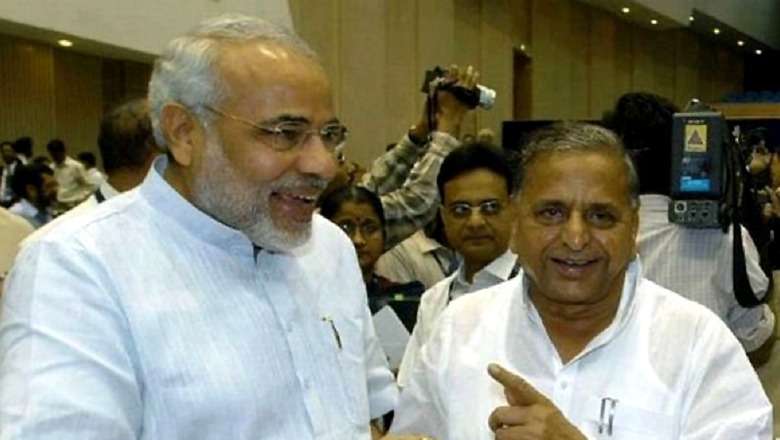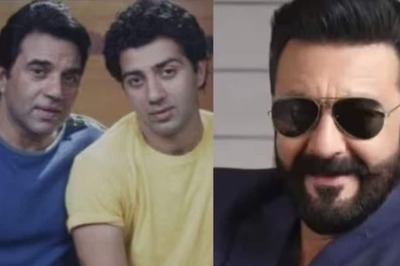
views
The frequency of Prime Minister Narendra Modi’s Gujarat visits has increased. This is an election year for the state with assembly polls likely in the month of December. The model code of conduct may come into force at any time in the next few days, and that is why new projects and programmes are being inaugurated by PM Modi right now. In this connection, PM Modi was in Modhera on Sunday evening, and on Monday morning he was in Bharuch. When Modi is in Gujarat, he usually addresses people in his mother tongue Gujarati.
But on Monday, he started his speech in Hindi. It was not difficult to guess why this was so. Actually, while in Gujarat among his own people, before discussing local issues such as warning the populace about the dangers of Urban Naxals or sharing the roadmap of development for the next 25 years, PM Modi wanted to pay tributes to Mulayam Singh Yadav who breathed his last on Monday at Medanta hospital in Gurugram after a prolonged illness.
Modi termed the demise of Mulayam as a great loss for the country and spoke at length about his personal relationship with him. Be it his several encounters with him as a chief minister or as PM after the 2014 Lok Sabha election win in Parliament or outside, Modi shared it all. He mentioned how in 2013, when he became the prime ministerial candidate of the BJP, Mulayam had given him his blessings and had also offered him very useful advice after he became the Prime Minister in 2014.
Modi said that Mulayam was a big-hearted leader and there is a reason for it. The Prime Minister himself said that before the 2019 general elections, in the last session of the previous Lok Sabha, Mulayam had predicted that Modi would return to Parliament after winning the polls as he takes everyone along and that is why he believes he would be victorious in the 2019 electoral battle and become the PM once again.
At first glance, Modi and Mulayam appear to be two opposite poles of Indian politics. Mulayam was the face of Mandal Politics in the 1990s while Modi was one of the pillars of Kamandal Politics. Modi carried out the complete planning of the Ram Rath Yatra of LK Advani in 1990 and had got it started from Somnath while Mulayam as chief minister of Uttar Pradesh had ordered the firing on a group of karsevaks in Ayodhya that had claimed the lives of several devotees.
Mulayam was dead against the building of the Ram Mandir in Ayodhya at the Ram Janmabhoomi. His entire politics was focussed on consolidating Yadav-Muslim votes in his favour whereas Modi not only staunchly favoured a Ram temple in Ayodhya but while as PM he ensured that the obstacles in the path of the temple were removed and reached Ayodhya in August 2020 for its groundbreaking ceremony. Famous as “Netaji” in politics among his well-wishers, the SP patriarch was even called “Mulla Mulayam” for wooing Muslims while Modi has been termed “Hindu Hriday Samrat” (King of Hindu Hearts).
On casual observation, there was nothing in common in their politics or in their identities, so why were their personal equations so good? The answer to this lies in the special charm of Mulayam that had many in Indian politics bowled over, and this included Modi. Not willing to compromise when it came to his political ideology, Mulayam knew how to form personal relations and ensure their sanctity. This was the reason that not only to those in Samajwadi (socialist) politics, even to others he was “Netaji”.
Rising above the party lines to help someone or praising someone wholeheartedly for their good qualities was in the very nature of Mulayam. Had not this been the case, how could Mulayam proclaim in the House that Modi would win the 2019 general election and return as PM and greeted him on it, bearing in mind that in Uttar Pradesh, which sends the maximum number of members to the Lok Sabha, the BJP was in a direct fight against Mulayam’s Samajwadi Party.
In the past decade, the relationship between Mulayam and Modi had become very close. Very few people know that even as Mulayam’s son Akhilesh had become the chief minister of UP after his party won the assembly polls in 2012, just after Modi was declared the PM candidate by the BJP, Mulayam had said to his close associates that in the 2014 general elections, it is Modi who will come out on top.
Reliable sources say that Mulayam Singh himself had called Modi in September 2013 and had greeted him after his name was cleared by the BJP parliamentary board as the prime ministerial candidate. Just a few days after this announcement was made by the BJP, Mulayam telephoned Modi and congratulated him in advance on his success in the 2014 general elections. Not only this, Mulayam had even said in jest, “Modi ji, you will ruin my son’s career”.
Mulayam had only stated the obvious. His son had won a thumping majority in the assembly elections in 2012 and had become the chief minister of UP. Had the SP done well in UP in the 2014 Lok Sabha elections, Akhilesh would have emerged as a big leader on the national scene. But Mulayam, who had his fingers on the pulse of Indian politics, knew that Modi would not let that happen in UP. And this is precisely what happened. In the Lok Sabha elections of 2014, the SP won just 5 seats – only those that were the strongholds of Mulayam’s family. There are very few in Indian politics who could dare to state the obvious before their political rivals so openly and even greet them in advance. When Modi said on Monday that Mulayam was a large-hearted politician, he definitely would have had many stories about him in mind, several of them from his own experiences.
It was this speciality of Mulayam’s personality that made Modi his great fan. That is why, when it was time for Modi to take oath as PM for the first time, he himself called Mulayam and invited him to witness it. Mulayam accepted his invitation and was present on this occasion. The importance of Mulayam to Modi was there for everyone to see on the evening of May 26, 2014, at the time of the oath-taking ceremony.
On that evening, Mulayam came and sat down somewhere in the back. As Amit Shah saw this, he himself came rushing to Mulayam, brought him to the front row and made him sit there. It was the same Amit Shah who was showing respect to Mulayam who had steered the 2014 election campaign of Modi in UP as his close lieutenant. As general secretary of BJP, Shah was handling the election campaign in UP and played a vital role in winning 71 seats. It was Mulayam’s party SP that suffered the most because of the win of BJP in Uttar Pradesh as the Samajwadi Party was pushed to the margins and at the centre of all this were Modi and Shah. But this picture of Shah bringing Mulayam to the front row became the poster of amity between the fierce political rivals. This became a shining example of love and respect in the high tradition of Indian politics during that evening when a new history of politics was emerging.
Not only this, after the assembly elections in 2017 when Yogi Adityanath became the chief minister of the BJP government in UP, even in that oath-taking ceremony, Mulayam was given a place of honour and was seated on the dais. The architects of this win in UP were also none other than Modi and Shah. This was Mulayam’s large-heartedness that while the BJP had marginalised his party in the politics of UP and had snatched power from his heir and son Akhilesh Yadav, when invited by it and the architects of his defeat, he agreed to come to the oath-taking ceremony and gave his best wishes to new chief minister Yogi Adityanath. On Monday, the same Yogi Adityanath, who is leading the BJP government as the CM of the state in his second term, wasted no time in declaring a three-day state mourning in his honour. Not only Modi and Yogi but every big leader of the BJP was found paying rich tributes to Mulayam. Union home minister Amit Shah immediately reached Medanta hospital where the SP leader breathed his last on Monday morning.
How much Modi respected Mulayam is clear from the fact that on the invite of Mulayam’s family, Modi had even travelled to Saifai in 2015. The occasion was the matrimonial alliance between the families of Lalu Prasad Yadav and Mulayam – the two stalwarts of Yadav politics in two major states of the country. The grandson of Mulayam’s brother was marrying one of Lalu’s daughters and Modi had reached Saifai despite being extremely busy. Modi was welcomed by none other than Mulayam himself and he took him to the ceremony.
Recently, Indian politics has become extremely acrimonious and personal attacks have broken all records. Words no longer bear the same sanctity that they used to previously in Indian political discourse and even abusive terms have been used without any remorse by the opposition for persons sitting on the posts of PM and President. In such circumstances, the bonhomie between Modi and Mulayam is a shining example for newcomers to Indian politics to take inspiration from. Political differences are very common and natural but they should not divide hearts, and this is the message Netaji seems to have sent across and Modi has himself been a witness to this.
Read all the Latest Politics News and Breaking News here



















Comments
0 comment